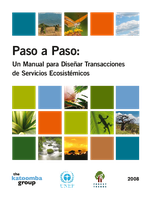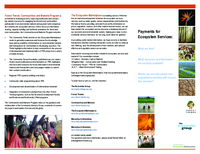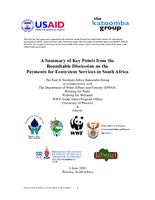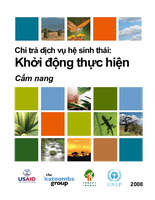Forest Trends

2008
2008 Katoomba Market Mechanism Meeting (Chesapeake Bay, MD, USA)
June 11-12, 2008, Chesepeak Bay, MD, USA - Private Katoomba Meeting on "How to Design and Implement Market Mechanisms to Improve Water Quality Throughout the Chesapeake Bay Watershed: host by the Katoomba Group and Forest and made possible by support from USAID through the TransLinks cooperative agreemetn.
2008 Katoomba XIII Meeting (Dar-es-salaam and Morogoro, Tanzania)
September 16-18, 2008, Dar-es-salaam, Tanzania and September 18-20, 2008, Morogoro, Tanzania - This 2008 East and Southern African Katoomba Group meeting was hosted by the Katoomba Group and Forest Trends, with support from USAID through the TransLinks Cooperative Agreement.
Payments for Ecosystem Services: Getting Started - A Primer (Spanish)
This primer forms part of the activities implemented within the Global Strategy for the Millennium Ecosystem Assessment Follow-Up, and offers a starting point from which to assess the potential for PES in specific communities around the world. It also provides pointers for designing and planning PES transactions. Community-benefit driven, or “pro-poor” PES, is the main focus of this work. Specifically, this primer describes: The opportunities and risks of PES schemes for rural community residents in order to enable accurate feasibility assessments for applying these new market-based mechanisms, steps to developing PES projects, and resources for additional reference and reading. In Spanish (Paso a Paso: Un Manual para Diseñar Transacciones de Servicios Ecosistémicos). See RELATED CONTENT for English, Portuguese and Vietnamese versions.
Payments for Ecosystem Services: Getting Started - A Primer
This primer forms part of the activities implemented within the Global Strategy for the Millennium Ecosystem Assessment Follow-Up, and offers a starting point from which to assess the potential for PES in specific communities around the world. It also provides pointers for designing and planning PES transactions. Community-benefit driven, or “pro-poor” PES, is the main focus of this work. Specifically, this primer describes: The opportunities and risks of PES schemes for rural community residents in order to enable accurate feasibility assessments for applying these new market-based mechanisms, steps to developing PES projects, and resources for additional reference and reading. See RELATED CONTENT for Portuguese, Spanish and Vietnamese versions.
Payments for Ecosystem Services
Brochure on Payments for Ecosystem Services programs and resources available through Forest Trends and the Katoomba Group.
Summary of Key Points from the Roundtable Discussion on the Payments for Ecosystem Services in South Africa
A Summary of Key Points from the Roundtable Discussion on the Payments for Ecosystem Services in South Africa
Payments for Ecosystem Services: Getting Started - A Primer (Vietnamese)
This primer forms part of the activities implemented within the Global Strategy for the Millennium Ecosystem Assessment Follow-Up, and offers a starting point from which to assess the potential for PES in specific communities around the world. It also provides pointers for designing and planning PES transactions. Community-benefit driven, or “pro-poor” PES, is the main focus of this work. Specifically, this primer describes: The opportunities and risks of PES schemes for rural community residents in order to enable accurate feasibility assessments for applying these new market-based mechanisms, steps to developing PES projects, and resources for additional reference and reading. In Vietnamese (Chi trả dịch vụ hệ sinh thái: Khởi động thực hiện Cẩm nang). See RELATED CONTENT for English, Portuguese and Spanish versions.
Payments for Ecosystem Services: Getting Started - A Primer (Portuguese)
This primer forms part of the activities implemented within the Global Strategy for the Millennium Ecosystem Assessment Follow-Up, and offers a starting point from which to assess the potential for PES in specific communities around the world. It also provides pointers for designing and planning PES transactions. Community-benefit driven, or “pro-poor” PES, is the main focus of this work. Specifically, this primer describes: The opportunities and risks of PES schemes for rural community residents in order to enable accurate feasibility assessments for applying these new market-based mechanisms, steps to developing PES projects, and resources for additional reference and reading. In Portuguese (Pagamentos por Serviços Ambientais: Um Manual Sobre Como Iniciar). See RELATED CONENT for English, Spanish and Vietnamese versions.









